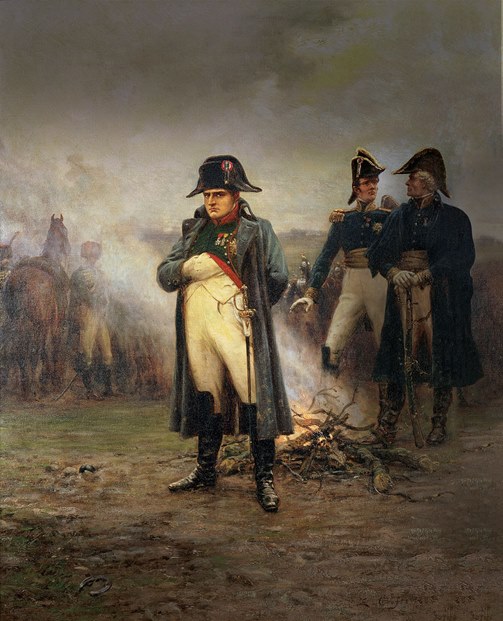The dedication and later the renaming of Beethoven’s Third Symphony is one of the most cited stories in the history of classical music. Beethoven initially admired Napoleon, dedicated his symphony to him, but later when he had heard the news of Napoleon’s own declaration as Emperor, he changed the name to Eroica instead.
There had to be a strong self-identification on Beethoven’s part with Napoleon. They were the same age (one year difference), both coming from humble background, neither of them from nobility. They both came from provinces to the capital to achieve their successes. They were about the same height, too.
Was it Marshal Bernadotte who inspired the composition and dedication of the Third Symphony to Napoleon, we do not know for certain. At first Beethoven named his composition Bonaparte, a very brave move, when one lives in Vienna, the capital of the enemy – we must add. When Ries broke the news in 1804 that Napoleon proclaimed himself Emperor, Beethoven was furious and disappointed. Ries remembers the events as this:
“In writing this symphony Beethoven had been thinking of Buonaparte, but Buonaparte while he was First Consul. At that time Beethoven had the highest esteem for him and compared him to the greatest consuls of ancient Rome. Not only I, but many of Beethoven’s closer friends, saw this symphony on his table, beautifully copied in manuscript, with the word “Buonaparte” inscribed at the very top of the title-page and “Luigi van Beethoven” at the very bottom. …I was the first to tell him the news that Buonaparte had declared himself Emperor, whereupon he broke into a rage and exclaimed, “So he is no more than a common mortal! Now, too, he will tread under foot all the rights of man, indulge only his ambition; now he will think himself superior to all men, become a tyrant!” Beethoven went to the table, seized the top of the title-page, tore it in half and threw it on the floor. The page had to be re-copied and it was only now that the symphony received the title “Sinfonia eroica.”
This alienation was not permanent, though, and there is evidence for Beethoven keeping Napoleon in mind and changing his opinion. One source to support this possibility comes from Baron de Trémont, who visited Beethoven in 1809 and had the honor to come to friendly terms with the socially withdrawn composer. He had the impression that despite the events Beethoven is still curious about the Frenchman. The Baron recalled, “The greatness of Napoleon preoccupied him and he often spoke to me about it. I observed, he admired Napoleon’s ascent from such a low beginning. It suited his democratic ideas.” They also discussed the possibility of Beethoven visiting Paris with the Baron. He asked many questions about Napoleon and about obligations he would face if this happened, like paying a visit to the Emperor, etc. As a conclusion Trémont had the opinion and these questions led him “… to infer that, in spite of his convictions, Beethoven would have been flattered by distinctions bestowed upon him by Napoleon.”
Further evidence that the household name Bonaparte was not completely despised by Beethoven is the fact that for some degree he was playing with the idea of accepting the invitation of Jerome Bonaparte, the new King of Westphalia. The offer that came in 1808, was the position of Kapellmeister or court composer to the Court of Cassel. Serious money and freedom of art was promised along the title.
In 1810, when he finished his Mass in C, Opus 86, he was looking for dedicatee. In his notes to himself he wrote, it “could perhaps be dedicated to Napoleon.”
Later, in 1820, a friend had the following to write in Beethoven’s conversation book (something that was used for communication after the composer went deaf),
“I was [Napoleon’s] greatest enemy, but with the passage of time I have come to terms with him. If Napoleon were to return now, he could expect a better reception in Europe. He understood the spirit of the times and knew how to keep a firm hold on the reigns… He had an appreciation for art and science and hated darkness. He would have valued the Germans more and would have protected their rights… He fought the feudal system and was the protector of laws and rights.…”
This evidence shows us, that so many years later the topic was still on among the friends and in the circle of Beethoven. Again it comes up in 1824, when Karl Czerny went to a coffeehouse with Beethoven. On the table they discovered a newspaper mentioning Napoleon, to which Beethoven remarked, “Napoleon! Formerly I disliked him. Now I think quite differently.”
When Napoleon died in exile on St. Helena on May 5, 1822, Beethoven said, “I have already composed the proper music for that catastrophe.” Many believe that the Dona nobis pacem section in his Missa Solemnis may have been inspired by Napoleon’s death.







